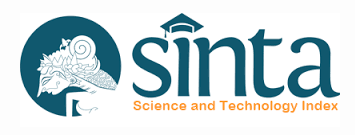IMPLEMENTASI PROGRAM DAERAH PEMBERDAYAAN MASYARAKAT (PDPM) DALAM MEWUJUDKAN ”KABUPATEN TEGAL OPEN DEFECATION FREE 2019”
Abstract
The Community Based Total Sanitation Program (STBM) is a program launched by the Ministry of Health of the Republic of Indonesia. One of the pillars of the STBM, Open Defecation Free (ODF), is one of the homeworks of the local government. In contrast to other districts, in Tegal Regency the implementation of this program was regulated directly in the Regent's Regulation on the Regional Program for Community Empowerment. The purpose of this study is to explore further how PDPM will be implemented in an effort to realize Tegal Open Defecation Free District in 2019. The method used in the preparation of this study is descriptive qualitative. The author uses two data sources namely primary and secondary through in-depth interviews with three informants and documentation. The results show that so far the Jambanisasi PDPM has been considered successful in building public awareness of the importance of healthy sanitation. The implementation of ODF through the three main components of STBM and triggering techniques to meet the three expectations, namely right target, quality and benefits. PDPM Jambanisasi has succeeded in empowering communities in the health and economic fields through the community of sanitation entrepreneurs.
References
Achmadi, Umar Fahmi. 2008. Horison Baru, Kesehatan Masyarakat Di Indonesia. Jakarta : Rineka Cipta
Adi, Isbandi Rukminto. 2007. Perencaan Partisiparotis Berbasis Aset Komunitas: dari Pemikiran Menuju Penerapan. Depok : FISIP UI Press
Arifianty, Della Putri. 2017. “Peran Pemerintah Lokal Dalam Peningkatan Sanitasi Lingkungan Masyarakat : Studi Tentang Keberhasilan Program Open Defecation Free (ODF) Di Kabupaten Bojonegoro”. Jurnal Kebijakan dan Manajemen Publik. Volume 5, Nomor 3. Universitas Airlangga
Davik, Farouk Ilmid. 2016. “Evaluasi Program Sanitasi Total Berbasis Masyarakat Pilar Stop BABS di Puskesmas Kabupaten Probolinggo”.Jurnal Administrasi Kesehatan Indonesia. Vol 4. Universitas Airlangga
Direktorat Jenderal Kesehatan Masyarakat. 2017. Panduan Praktis 5 Pilar STBM Untuk Masyarakat. Jakarta : Kementerian Kesehatan RI
Ditjen Pengendalian Penyakit dan Penyehatan Lingkungan. 2011. Modul Pelatihan Stop Buang Air Besar Sembarang (Stop BABS). Jakarta : Kementerian Kesehatan RI
Ditjen Pemberantasan Penyakit dan Penyehatan Lingkungan. 2015. Panduan Pelaksanaan Verifikasi 5 Pilar STBM. Jakarta : Kementerian Kesehatan RI
Istiyanto, S. Bekti. 2017. Komunikasi Pemberdayaan Masyarakat. Yogyakarta : Pustaka Ilmu
Kriyantono, Rachmat.2006. Teknik Praktis Riset Komunikasi. Jakarta: Kencana
Kriyantono, Rachmat. (2012). “Teknik Praktis Riset Komunikasi Cetakan ke-6”. Jakarta: Kencana Prenada Media Group.
Moleong, Lexy J. 2004. Metodologi Penelitian Kualitatif. Bandung: PT. Remaja
Rosdakarya
Moleong, Lexy J. 2006. Metodologi Penelitian Kualitatif. Bandung: PT. RemajaRosdakarya.
Notoatmodjo, Soekidjo. (2005). Promosi Kesehatan : Teori dan Aplikasi. Jakarta :
PT. Rineka Cipta.
Peraturan Menteri Kesehatan No. 3 Tahun 2014 tentang Sanitasi Total Berbasis Masyarakat (STBM).
Peraturan Bupati Tegal Nomor 2 TAHUN 2018 tentang Juklak Program Daerah Pemberdayaan Masyarakat (PDPM)
Profil Kesehatan Kabupaten Tegal Tahun 2015. Pemerintah Daerah Kabupaten Tegal Dinas Kesehatan. 2016
Sholikhah, Siti. 2014. “Hubungan Pelaksanaan Program ODF (Open Defecation Free) dengan Perubahan Perilaku Masyarakat dalam Buang Air Besar di Luar Jamban di Desa Kemiri Kecamatan Malo Kabupaten Bojonegoro Tahun 2012”. Jurnal Surya. Vol 02. Stikes Muhammadiyah Lamongan
Sugiyono. 2013. Metode Penelitian Pendidikan Pendekatan Kuantitatif,
Kualitatif, dan R&D. Bandung: Alfabeta.
Once an article was published in the journal, the author(s) are:
granted to the journal right licensed under Creative Commons License Attribution that allows others to share the work with an acknowledgment of the work's authorship. permitted to publish their work online in third parties as it can lead to wider dissemination of the work. continue to be the copyright owner and allow the journal to publish the article with the CC BY license receiving a DOI (Digital Object Identifier) of the work.





